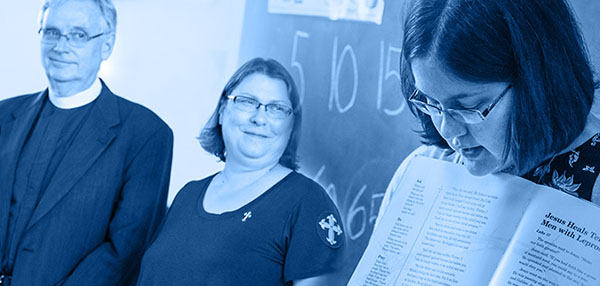Mental Illness, Health and Wellness
Resources from The Lutheran Church—Missouri Synod
The LCMS encourages all pastors, church workers and congregations to actively advocate for mental health and wellness among their people and provide Christ-centered compassion and ministerial supportive care to those in need through prayer, private confession and absolution, and the Means of Grace (2019 Res. 3-04A).
It is estimated that 1 in 5 adults will experience a diagnosable mental illness in any given year. (This figure is 1 in 6 for children between ages 6 and 17.) The more prevalent illnesses, which account for 80% of cases, are the anxiety disorders, major depression, the substance use disorders and the trauma-based disorders.
Less prevalent and yet persistent and serious mental illnesses including schizophrenia and bipolar disorder affect 1 in 20 persons. Having more than one condition at the same time (called “comorbidity”) is extremely common. As alarming as they are, these figures tell less than half of the story.
Many persons will experience serious emotional distress but not meet criteria for a formal diagnosis. In what the National Alliance for Mental Illness (NAMI) calls the “ripple effect,” mental health problems profoundly affect families and caregivers. Those caring for someone with serious mental illness, such as a child who has an autism spectrum disorder or a parent with dementia, dedicate an enormous amount of emotional and physical energy to that unending labor of love, resulting in emotional exhaustion, burnout and “ripple effect” mental illnesses.
Ministry Goal
Our pastors and congregations will reach out to and accept people with mental illness into their midst. Our vision is that those living with mental illness/brain disorders and their families would be full participants in the life and ministry of the church.
Resources

Mental illness, like all diseases, is rooted in sin. Original sin, that is. The Lutheran Witness presents a Lutheran perspective on mental illness and health.

A top priority of The Lutheran Church—Missouri Synod is to promote and nurture the spiritual, emotional, and physical well-being of pastors and church workers. The Synod offers resources to address nine common areas of concern.
Topics: Identity in Christ; Supportive and encouraging culture; Healthy churches, schools, and ministries; Finances; Relationships; Caregivers; Recognition and connection; Awareness, resources, and advocacy; Care provided locally.
"Ministry to People with Mental Illness and Their Families" — Helpful Information from the LCMS Disability Task Force for those involved in ministry to people with mental illnesses.
"God’s Presence in Suffering: The Theology of the Cross" — In this essay the Rev. Dr. Herbert C. Mueller Jr. offers a perspective on God's presence in our suffering. "Jesus will never fool you or minimize your suffering. He knows that your pain is real, because Jesus knows pain."
Video: “You are Not Alone” — A seminar by the Rev. Dr. Daniel Preus for congregations to use in developing ministry to mentally ill people and their families
I Trust When Dark My Road: A Lutheran View of Depression — This book by the Rev. Dr. Todd Peperkorn offers a glimpse into one LCMS pastor’s personal journey through depression while relying on God’s grace.
"Clergy Mental Health and the Doctrine of Justification" — The purpose of this study is to find and describe the connection between clergy stress and burnout and the doctrine of justification, often called in Lutheran circles the chief doctrine. This study was written by the Rev. Dr. Robert D. Preus.
Jonah’s Desire to Die — This Bible study and accompanying article cover the book of Jonah. Though Jonah is famous for his fish, he also provides an illuminating case study of depression and suicidal thought. Article | Bible Study
Youth Ministry Resources
- Bible Studies Bible Studies
-
“Walking in the Light” is a five-study series designed to shine a light on mental health. God works in and through us, even in times when we struggle with our mental health. The darkness of this world and in our minds is no match for our REAL, PRESENT God! Jesus is the ONE and ONLY source of eternal light.
“Light in the Darkness” is a single study for talking with teens about depression and God’s comfort and light.
“The ‘S’ Word” is a single study and talk sheet to use with youth who are struggling after the suicide of a friend or loved one, or are wrestling with their own suicidal feelings. The study can also be used to help youth work through difficult topic they wish to know more about.
- Articles Articles
-
“How Can I Help?” — is an article designed to help adults support youth who have people in their life who struggle with mental health. It can also help adults understand how to support youth leaders as they care for teens who struggle with mental health.
"Giving Comfort to Hurting Teens" — is an article to help us talk more openly and honestly about mental health, especially in the church. Supportive adults can pause and educate themselves and others about how to care for young people’s mental health in a Christ-centered way. Here are some practical ways to navigate and educate on mental health in your youth ministry.
"Practical Ways to Navigate and Educate on Mental Health" — is an article to help us talk more openly and honestly about mental health, especially in the church. Supportive adults can pause and educate themselves and others about how to care for young people’s mental health in a Christ-centered way. Here are some practical ways to navigate and educate on mental health in your youth ministry.
"Let's Talk about Mental Health" — is an article intended for youth workers. Since mental health concerns are a prominent part of many people’s lives, it’s important for youth workers to understand the big picture and how this topic affects us both personally and professionally in our own ministry areas.
"Real Truths You Need to Know about Depression" — is an article that talks about some of the key truths about depression.
"Q&A with a therapist on teen depression"
"When Your Teen Goes Through a Crisis" — is written for parents who need some insight into how to care for a teen in a crisis. Because of the emotional instability of the teen years, it’s not unusual for a teen to go through a crisis.
"How to Help Youth Cope after a Suicide" — includes tips for leaders and lists common questions youth may ask.